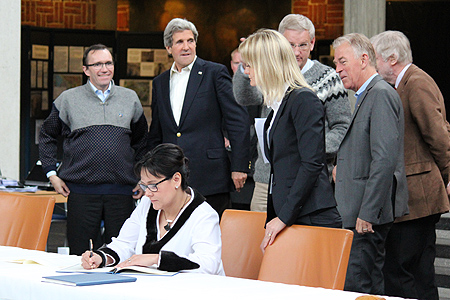Ministers from the eight Arctic states and representatives of the Arctic Indigenous Peoples met today in Kiruna, Sweden at the conclusion of Sweden’s two-year chairmanship of the Arctic Council.

At the meeting, the group adopted a joint vision statement for the future of the Arctic and signed a new, legally-binding Agreement on Cooperation on Marine Oil Pollution Preparedness and Response in the Arctic which will substantially improve procedures for combatting oil spills in the Arctic.
A number of important reports were presented to the Ministers at the meeting:
- The Arctic Biodiversity Assessment produced by the Arctic Council’s Conservation of Arctic Flora and Fauna group presents the status and trends in Arctic biodiversity based on best available science informed by traditional ecological knowledge, and includes policy recommendations for Arctic biodiversity conservation.
- The Arctic Ocean Review coordinated by the Arctic Council’s working group on Protection of the Marine Environment analyzes the global and regional instruments and measures that govern the Arctic marine environment, and provides policy recommendations for Arctic states to strengthen the conservation and sustainable use of the Arctic marine environment.
- The Arctic Ocean Acidification assessment produced by the Arctic Council’s Arctic Monitoring and Assessment Programme working group is the first major scientific study of the impacts that acidification of the Arctic Ocean may have on Arctic marine ecosystems, and the northern communities and indigenous peoples who depend on them.
During the meeting, ministers also signed the Kiruna Declaration, which sets out the work of the Council during the Canadian Chairmanship (2013-15). The program will include the establishment of a Circumpolar Business Forum to provide new opportunities for business to engage with the Council; continued work on oil pollution prevention; and action to address short-lived climate pollutants such as black carbon and methane.









